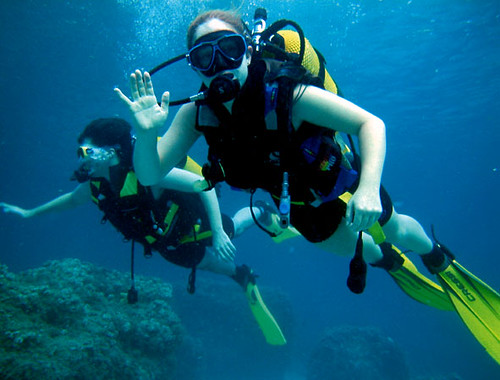Scuba Diving Certification Requirements
Published by Nanni on Saturday, August 04, 2012
Photo credit by SLU Madrid Campus
Scuba diving is a fascinating sport. But in order to have fun and do so safely, it is important to take the certification process seriously. Since most dive operators won't allow an uncertified diver to participate, certification is essential. What exactly is involved in getting certified for scuba diving?
Before Signing Up for a Certification Program
Like any physical exercise, it is important to ensure that one is in the proper shape to participate. Scuba diving is no different. Before allowing anyone to participate, there is a medical questionnaire that must be completed. If any medical condition is noted, an examination by a doctor will be required to ensure that there aren't any physical conditions that would preclude diving. Even if no known medical conditions exist, it would be a good idea to have a general physical exam. Sixty feet under water is not the place to discover an unknown medical problem.
Classroom Training
The first part of the scuba diving certification process is done in the classroom. In fact, students are given materials to study, and are expected to have completely read through the books and to have completed all written review questions before entering the classroom. This ensures that time is not wasted and that questions and discussions are beneficial to all.
In the classroom, basic theory and concepts will be discussed and questions answered. Some written dive planning exercises will also be completed to ensure that all students understand the basic theory of dive tables and how breathing under pressure affects the human body. Also, all equipment will be discussed and reviewed.
Practice in a Controlled Environment
In addition to classroom theory, hands on practice will also be provided. This normally happens in the controlled environment of a pool or in very shallow water. The idea is to get the student familiar with the equipment, with breathing underwater and with dealing with minor difficulties like a mask full of water. A series of skills will be taught, and each student must complete all activities.
Written and Skills Tests
After the classroom and shallow water portions are completed, students will have to pass a written exam and a basic skills test. In a controlled underwater environment, students will demonstrate that they can perform basic scuba skills as well as some emergency skills, such as:
- Locating and using an alternate air source
- Sharing air with another diver, or "buddy breathing"
- Clearing water from a flooded mask
- Removing and replacing the mask underwater
- Removing and putting all equipment back on underwater
- Demonstrate basic buoyancy control
Open Water Certification Exam
After passing the training, it is time for the student to repeat all skills in open water, such as a lake or ocean. This basically consists of five separate dives over the course of about a day and a half, all under close supervision. During each dive, different skills are demonstrated. In order to get their Open Water Certification, all five dives must completed along with proper performance of all practical skills. Once that has been done, the student is considered ready for basic scuba diving on their own.
Further Training
The basic Open Water Certification isn't the end of the training possibilities. While many people may never take any more classes, there are a large variety of courses to expand the student's abilities and opportunities to participate in such things as deep diving, night diving, wreck diving and underwater photography. In fact, if a scuba diver can do it, there's probably a class for it.
 | Posted in »
| Posted in »

0 comments: Responses to “ Scuba Diving Certification Requirements ”